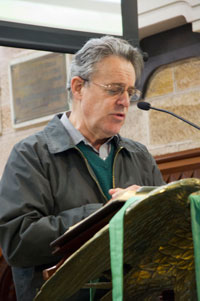Samuel Marsden has gone down in popular history as 'the flogging parson' but a new book balances the historical ledger.
The work, 'Launching Marsden’s Mission: The Beginnings of the Church Missionary Society in New Zealand' has itself been launched where the long serving chaplain to the colony was farewelled in 1838.
Veteran historian Stuart Piggin spoke at the official function at St John's Parramatta, making the point that Marsden's funeral in Parramatta featured almost 60 carriages, one of the largest funeral processions in the colony’s history.
But in the more than 175 years since his death, historians have come to varying conclusions about Marsden, especially his decision to accept a position as a civil magistrate in the colony. As well as acquiring large landing holdings he gained a reputation as a dispenser of severe justice.
Editors Dr Peter Bolt and the Rev David Pettett say the book 'does not attempt to recast Marsden as a man with no faults. No attempt is made to gloss over the things that history has judged that he should not have done and the things he neglected. Rather, alongside these, this book places the great work Marsden did to take the gospel to the people of New Zealand."
In fact the book is being published in time for the 200th anniversary celebrations of Marsden’s first sermon in the Bay of Islands.
Arising from lectures at last years Moore Theological College Library Day, it features chapters from historians Michael Gladwin, Malcolm Prentis and Meredith Lake, New Zealander Malcolm Falloon, missiologist Greg Anderson, the rector of North Sydney Simon Manchester and Craig Schwarze, who is writing a biography of Marsden's college, first fleet chaplain Richard Johnson.
Dr Piggin says the book "is full of new perspectives on the controversial chaplain, and yes, we do need this book, and you need to read it."

"Clearly the CMS thought of Marsden as a great man, as did their missionary, Alfred Brown, as did, more importantly, Maori."
Dr Piggin spoke of Marsden's last visit to New Zealand where he was "mobbed by Maori who came from near and far to pay their last respects to their revered benefactor."
But, he says "The Aboriginal boys he adopted did not warm to him, and the only warmth coming from most Australian historians towards Marsden is one of white-hot indignation at the severity of the flogging parson/magistrate and the acquisitiveness of the fleecing parson/farmer."
In a chapter dealing with that issue, Marsden is described as coming from a line of evangelicals who ‘modelled Evangelical piety with a strong sense of duty, strong social conservatism and a willingness to use political means to bring about moral reformation.’
Dr Piggin says "We might say that Marsden should have exercised his magistracy less severely and sought to ameliorate the harshest of laws, but we can be less certain that he should not have been at all in the business of exercising the responsibilities of magistrate. For whatever reason, we have inherited an evangelical Christianity less engaged with, and less responsible for, the condition of this age, this kingdom, this city, than we might be."
However, he pointed to the focus of the book, Marsden's mission, as a corrective for the present day.
"We have much to learn and unlearn about missionary strategy. This book shows the value of good history in helping us with this double need in our education." Dr Piggin said.
The book, Launching Marsden’s Mission: The Beginnings of the Church Missionary Society in New Zealand, is published by Latimer Trust. It can also be ordered online through Book Depository.























